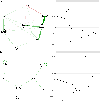An Intensive time series investigation of the relationships across eating disorder-specific fear responses and behavior urges in partially remitted anorexia nervosa
- PMID: 38128286
- PMCID: PMC10923000
- DOI: 10.1016/j.janxdis.2023.102804
An Intensive time series investigation of the relationships across eating disorder-specific fear responses and behavior urges in partially remitted anorexia nervosa
Abstract
Anorexia nervosa (AN) is a serious and persistent psychiatric illness. Many individuals with AN cycle between stages of remission (i.e., relapse), with research documenting that cognitive remission generally lags behind nutritional/weight restoration. Yet, little is known about which mechanisms promote movement from partial remission in AN (defined as nutritional, but not cognitive, recovery) to full remission. Fear-based processes, including avoidance and approach behaviors, likely contribute to the persistence of cognitive-behavioral AN symptoms after nutritional restoration. The current study used intensive longitudinal data to characterize these processes during partial remission (N = 41 participants with partially remitted AN; 4306 total observations). We aimed to a) characterize frequency of fear-based processes in real-time, b) investigate associations across fear-based processes and behavioral urges, and c) test if real-time associations among symptoms differed across commonly feared stimuli (e.g., food, social situations). On average, participants endorsed moderate fear and avoidance, with weight-gain fears rated higher than other feared stimuli. Momentary fear, avoidance, approach, and distress were all positively associated with AN behavior urges at one time-point and prospectively. Central symptoms and symptom connections differed across models with different feared stimuli. These findings provide empirical support for the theorized fear-avoidance-urge cycle in AN, which may contribute to the persistence of eating pathology during partial remission. Fear approach may be associated with temporary increases in urges, which should be considered during treatment. Future research should explore these associations in large, heterogeneous samples, and test the effectiveness of exposure-based interventions during partial remission.
Keywords: Anorexia nervosa; Avoidance; Ecological momentary assessment; Fear; Remission.
Copyright © 2023 Elsevier Ltd. All rights reserved.
Conflict of interest statement
Declaration of Competing Interest The authors declare that they have no known competing financial interests or personal relationships that could have appeared to influence the work reported in this paper.
Figures
Similar articles
-
Facing Eating Disorder Fears: An Open Trial Adapting Prolonged Exposure to the Treatment of Eating Disorders.Behav Ther. 2024 Mar;55(2):347-360. doi: 10.1016/j.beth.2023.07.008. Epub 2023 Jul 22. Behav Ther. 2024. PMID: 38418045
-
Avoidance in Anorexia Nervosa: Towards a research agenda.Physiol Behav. 2021 Sep 1;238:113478. doi: 10.1016/j.physbeh.2021.113478. Epub 2021 May 28. Physiol Behav. 2021. PMID: 34058219
-
Inpatient versus outpatient care, partial hospitalisation and waiting list for people with eating disorders.Cochrane Database Syst Rev. 2019 Jan 21;1(1):CD010827. doi: 10.1002/14651858.CD010827.pub2. Cochrane Database Syst Rev. 2019. PMID: 30663033 Free PMC article.
-
An examination of eating disorder fears in imaginal exposure scripts.J Affect Disord. 2023 Apr 1;326:163-167. doi: 10.1016/j.jad.2023.01.121. Epub 2023 Feb 2. J Affect Disord. 2023. PMID: 36736788
-
Anorexia nervosa as a motivated behavior: Relevance of anxiety, stress, fear and learning.Physiol Behav. 2015 Dec 1;152(Pt B):466-72. doi: 10.1016/j.physbeh.2015.04.007. Epub 2015 Apr 3. Physiol Behav. 2015. PMID: 25846837 Review.
Cited by
-
Predictors of treatment outcome in higher levels of care among a large sample of adolescents with heterogeneous eating disorders.Child Adolesc Psychiatry Ment Health. 2024 Oct 17;18(1):131. doi: 10.1186/s13034-024-00819-8. Child Adolesc Psychiatry Ment Health. 2024. PMID: 39420352 Free PMC article.
-
Food Avoidance and Aversive Goal Value Computation in Anorexia Nervosa.Nutrients. 2024 Sep 15;16(18):3115. doi: 10.3390/nu16183115. Nutrients. 2024. PMID: 39339714 Free PMC article.
-
Momentary Associations Across Specific Affective States and Dysregulated Eating Experiences Among Children and Adolescents With Loss of Control Eating Symptoms.Int J Eat Disord. 2025 Mar;58(3):542-553. doi: 10.1002/eat.24356. Epub 2024 Dec 17. Int J Eat Disord. 2025. PMID: 39690879 Free PMC article.
References
-
- Abramowitz JS, Deacon BJ, & Whiteside SPH (2019). Exposure Therapy for Anxiety, Second Edition: Principles and Practice. Guilford Publications.
-
- American Psychiatric Association (Ed.). (2013). Diagnostic and Statistical Manual of Mental Disorders: DSM-5 (5th ed). American Psychiatric Association.
-
- American Psychiatric Association. (2022). Diagnostic and Statistical Manual of Mental Disorders (DSM-5-TR). American Psychiatric Association Publishing. 10.1176/appi.books.9780890425787 - DOI
Publication types
MeSH terms
Grants and funding
LinkOut - more resources
Full Text Sources
Medical


